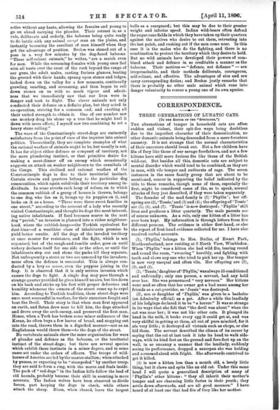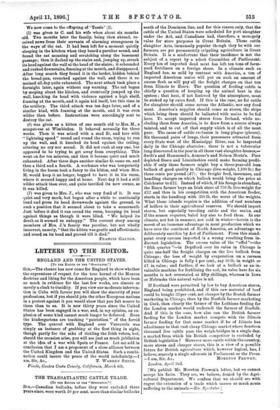CORRESPONDENCE.
THREE GENERATIONS OF LUNATIC CATS'.
[TO THE EDITOR 07 THZ " SPRCTATOR."]
THE alternations of temper in household cats are often sudden and violent, their spit-fire ways being doubtless due to the imperfect character of their domestication, no other domestic animals being descended from a more ferocious ancestry. It is not strange that the normal characteristics of their ancestors should break out. Not a few children have fits of fury like those of our savage forefathers, and not a few kittens have still more furious fits like those of the British wild-cat. But besides all this, domestic cats are subject to mental disorder which would tend to be combined, as they are in man, with vile temper and outbursts of rage. The seven instances in the same family group that are about to be mentioned, concur in supporting the belief indicated by the title to these remarks, though some of them, especially the- first, might be considered cases of the, so to speak, normal attacks of fury just described, if they were taken separately.
The founder of the mad family is (1) Phyllis '; her off- spring are (2), Tessie,' and (3) and (4); the offspring of Tessie ' are (5), (6), and (7). Tessie ' is now destroyed; 'Phyllis' still lives and produces a litter quarterly. The male parents are of course unknown. As a rule, only one kitten of a litter has. ever been kept. My information is through letters from five different persons. The evidence is either first-hand, or else the report of first-hand evidence collected for me. I have also received verbal accounts.
(1), 'Phyllis,' belongs to Mrs. Butler, of Ewart Park, Northumberland, now residing at 8 North View, Wimbledon. When'Phyllis ' was a kitten she had wild fits, tearing round and round the room, " swearing " horribly, and fighting with teeth and claws any one who tried to pick her up. Her temper is now very unequal and often vile. Her offspring are (2), (3), and (4).
(2), Tessie,' daughter of 'Phyllis,' was always ill-conditioned and unfriendly ; only one person, a servant, had any hold over her. She was pronounced "very nervous." Her kittens went mad so often that her owner got a bad name among her friends as a cat-provider, so 'Jessie' was destroyed.
(3), son or daughter of Phyllis,' was given to a bachelor (an Admiralty official) as a pet. After a while the landlady of his lodgings declared it to be "a horror." It was so strange in its ways that she felt that "the devil was about" when the cat was near her ; it was not like other cats. It plunged its head in the milk, it broke every egg it could get at, and was very skilful in getting at them, all out of pure mischief, for it ate very little ; it destroyed all victuals such as chops, or else hid them. The servant described the climax of its career by saying that the cat at last took it into its head to walk side- ways, with its hind feet on the ground and fore-feet up on the wall, in so uncanny a manner that the landlady, suddenly seeing its performance, dropped a saucepan she was holding and screamed aloud with fright. She afterwards contrived to get it killed.
(4) is now a kitten less than a month old, a lovely little thing, but it claws and spits like an old cat. Under this same head I will quote a generalised description of many of Phyllis's' other kittens : " they all inherit their mother's temper and are charming little furies in their youth ; they settle down afterwards, and are all good mousers." I have- heard of at least one that had fits of fury like her mother.
We now come to the offspring of Tessie' (2).
(5) was given to C. and his wife when about six months old. Two months later the family, being then abroad, re- oeived news from their servants of alarming strangeness in the ways of the cat. It had been left for a moment quietly sleeping in the kitchen when they heard a peculiar sound, and found the eat moaning and scratching along the basement passage; then it dashed up the stairs and, jumping up, struck it head against the wall at the head of the stairs ; it rebounded and rushed downstairs, foaming at the mouth, and disappeared. After long search they found it in the larder, hidden behind the bread-pan, crouched against the wall, and there it re- mained all day quite exhausted. The next attack took place a fortnight later, again without any warning. The cat began by moping about the kitchen, and eventually jumped up the wall, knocking its head with violence against a high shelf, foaming at the mouth, and it again hid itself, but this time in the scullery. The third attack was ten days later, and of a similar kind, with foaming at the mouth, and it was even wilder than before. Instructions were accordingly sent to destroy the cat.
(6) was given as a kitten of one month old to Mrs. M., a sempstress at Wimbledon. It behaved normally for three weeks. Then it was seized with a mad fit, and tore with "lightning speed" round and round the room, trying to run up the wall, and it knocked its head against the ceiling, uttering no cry nor sound. It did not rush at any one, but appeared to be trying to get away from everything. This went on for ten minutes, and then it became quiet and much exhausted. After three days another similar fit came on, and then a third and a fourth. A workman who was temporarily living in the house took a fancy to the kitten, and when Mrs. M. would keep it no longer, begged to have it in his room, where it seemed happy and at home. Next day it had a still wilder attack than ever, and quite terrified its new owner, so it was killed.
(7) was given to Mrs. J., who was very fond of it. It was quiet and very meek, but began after a while to continually bend and press its head downwards against the ground, in such a position that it seemed about to take a somersault. Just before it died it ran round the room, bumping its head against things as though it were blind. "We helped its death as it seemed so unhappy." The current story among members of Mrs. J.'s family was peculiar, but not wholly incorrect, namely, "that the kitten was gentle and affectionate, and stood on its head and purred till it died."
FRANCIS GALTON.



































 Previous page
Previous page